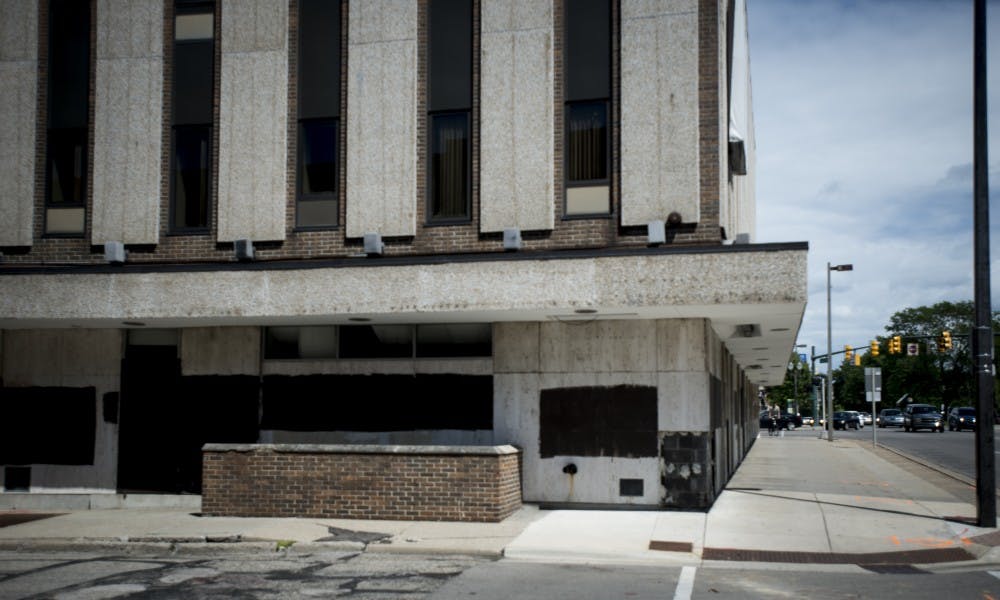East Lansing City Council added another doozy of a chapter to the “long tortuous history” of the Park District saga, fending off the ghosts of a previous developer whose legal claims to the project died years ago.
Council voted 4-0 Thursday to formally terminate the long-terminated Brownfield Plan #11 and current Brownfield Plan #23 while simultaneously approving Brownfield Plan #26. This fulfills state law and the Michigan Economic Development Corporation’s requirement that no two Brownfield plans be occupying the same site.
Councilmember Susan Woods was absent, as she is on vacation.
The termination of Brownfield Plan #11 did not go down without threats of a legal skirmish, which were quickly squashed by Mayor Mark Meadows and City Attorney Tom Yeadon. Both provided hard evidence to the contrary of claims that the prior developer could make to the site.
Arthur Siegal, hired by CDA Investment and Scott Chappelle to represent their claims to Brownfield Plan #11, presented his clients unhappiness with city’s process.
Further, he said his client believed was owed $6.1 million for eventual taxes captured through the plan and that his client had begun work on the project and therefore could still make a claim.
These claims were shot down quickly following Mr. Siegal's arguments.
When questioned over the $6.1 million he believed his client was owed, he said he did not have the specifics on him but it related to demolition and site preparation work.
As shown by the currently standing structures at the site, none of the work mentioned appeared to happen or gain much traction. A third building included in the proposed demolition, 303 N. Abbott, was demolished by the city last summer.
Further, CDA Investments’ legal claims to the property were ended in Ingham County Circuit Court on February 5th and the properties were awarded to the current developer, DRW, which is operating as 100 Grand River LLC for this project.
100 Grand River LLC, lawyer David Pierson made clear however none of the eligible costs generated from development could be captured until after the project is completed, therefore Chappelle and CDA could not lay claim to money without a project.
“Is it fair to assume that inability to perform is one of the things that would make obvious that we should terminate a prior agreement?” Meadows asked of Yeadon.
Yeadon agreed and made clear litigation over who owns the properties has already ended.
“The property is no longer owned by the applicant in Brownfield Plan #11, and clearly it meets the statutory definition that the project has not been done in two years,” Yeadon said.
Even further Meadows presented a letter from Chappelle which called for the withdrawal of his project, dated June 26, 2012.
“At this juncture it is my request that the development process be terminated and city council consider our request to withdraw the project from further consideration,” Meadows read aloud with a sly smile.
When asked what he made of the letter, Siegal responded he was not privy to that piece of correspondence.
Siegal contended that his client could still be owed for work done up to that point of the correspondence, to which Yeadon countered.
“No financing agreement was ever entered into a decision with the DDA regarding this project, so that indicates the reimbursement agreements are in no force and effect at this time,” Yeadon said. “When you withdraw your project from consideration, you’re certainly never going to enter into a financing agreement concerning the project.”
Yeadon also dug through a pre-development agreement from 2012 which had a provision the city and the developer must reach a development agreement by June 26.
Support student media!
Please consider donating to The State News and help fund the future of journalism.
“If we can’t agree to a development agreement, this agreement shall lapse and be of no further legal effect. The city shall be free to pursue other development….in any such event each party shall be deemed to be fully released from any liability the to other under this agreement for the expiring development agreement, except for its obligations under the indemnity provision,” Yeadon read aloud.
Only Chappelle was obligated under the indemnity agreement, and therefore the city has no obligations, Yeadon said. If the city is sued by Chappelle in the future regarding this, the city can recoup the fees of any legal action.
“We covered the city pretty well in these agreements,” Yeadon said, laughing. “I just wanted to make that pretty clear.”
Following the meeting Pierson said the main goal of 100 Grand River LLC is asking for “whatever it takes to properly adopt the brownfield plan that we want and put us in a position to request the amendment of the MBT credit so it can be used upon this project.”
Mayor Pro Tem Ruth Beier said following the meeting they expected a challenge from Chappelle.
"I think our protection was really tight in our agreement," Beier said. "If they don't get their financing then everything goes away. The development agreement goes away, the obligation under the brownfield goes away. And they never got their financing, so we don't have any obligation."
Discussion
Share and discuss “Council votes unanimously to formally terminate old Park District plans” on social media.







